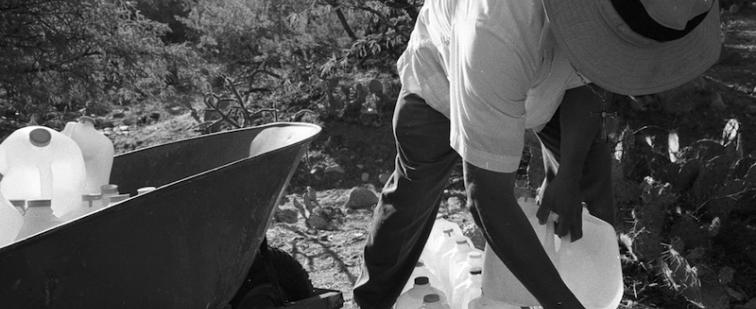Home
A NACLA investigative article into the Salvadoran branch of the International Law Enforcement Academy, a U.S.-sponsored global network of police schools, raised concerns among some human rights activists and U.S. policy analysts. They criticize the article as a "personal attack" against Benjamín Cuéllar, a Salvadoran human rights activist, whose organization offers human rights training at the academy. The author defends his findings writing that Cuéllar's participation constitutes "the co-optation" of human rights discourses in the service of U.S. military intervention.
The Caribbean coast of Honduras has been home to Afro-indigenous Garifuna communities for over 200 years. But a government-sponsored plan to build a tourist mega-resort on Garifuna lands in Tela Bay threatens not only their communally owned territories, but also an entire way of life for one of the planet's most unique cultures.
Throughout the 1980s, Republican candidate John McCain was a steadfast ally of the murderous Contra rebels trying to bring down the Sandinista Revolution in Nicaragua. During one of his trips to the Central American country, conflicting accounts of one meeting indicate McCain may have assaulted an unknown Sandinista official. If an obscure video taken of the meeting should surface, and confirms the incident, then it could sway the presidential election against the Arizona Senator.
Fred Baker’s Assata aka JoAnne Chesimard could have provided an occasion for reflection on the civil rights agenda and the people who fought for it in a clear-eyed, analytical way, lest we lose sight of the fact that the agenda for which so many suffered and died remains largely unfulfilled. The film's subject is both inspiring and controversial, a cautionary tale about the lengths to which the U.S. state was willing to go in quashing black radicals and a reminder of just how high the stakes really were.
Human rights activists from Latin America met in the Brazilian capital of Brasília in June to talk about and evaluate the efforts regional governments have made toward eradicating racism and discrimination. The conference is part of an ongoing process initiated by the landmark 2001 UN World Conference Against Racism held in Durban, South Africa.
Talk about pandering to your wanna-be, gotta-have conservative base. Senator John McCain, the maverick, who just last year led a major bipartisan campaign with liberal icon Ted Kennedy to pass sweeping immigration reform, is humming a different tune these days.
Outside of Ecuador, most progressives consider President Rafael Correa to be a Leftist champion of social and economic justice. Inside the country, however, conflicts between Correa and the social movement Left—the indigenous movement, environmentalists and unions, among others—have become increasingly heated.
 |
In early July in Sicaya, Cochabamba, Bolivian President Evo Morales announced that if he wins the August 10 recall vote on his presidency, "I'll have two and half years left." But if he loses the vote, "I’ll have to go back to the Chapare" to farm coca again. Though the recall vote is likely to favor Morales, it’s unclear if it will resolve many of the divided nation’s conflicts.
Recent coverage of the pending U.S. trade deal with Colombia made clear that major U.S. media outlets presented only their preferred side of the story rather than providing the public with the range of information necessary for an honest, informed debate on U.S. trade policy. Major media pulled out all the stops to come out in support of this one: NAFTA, human rights, terrorism, paramilitaries, Hugo Chávez... Wait, what?











